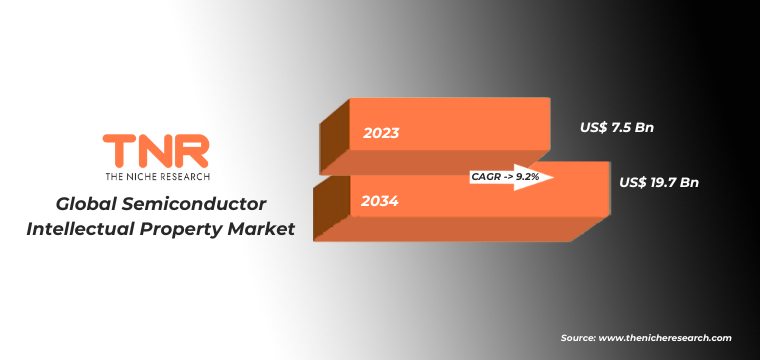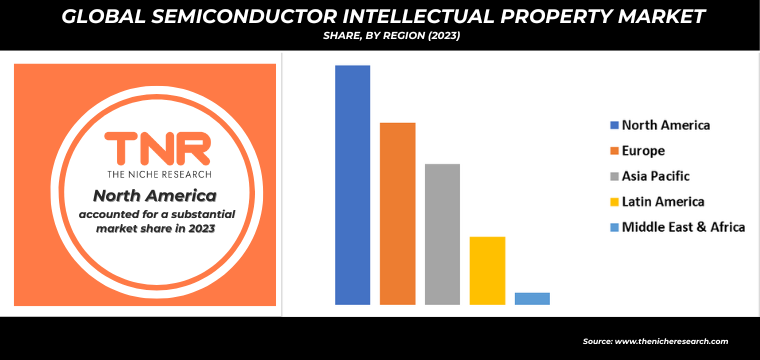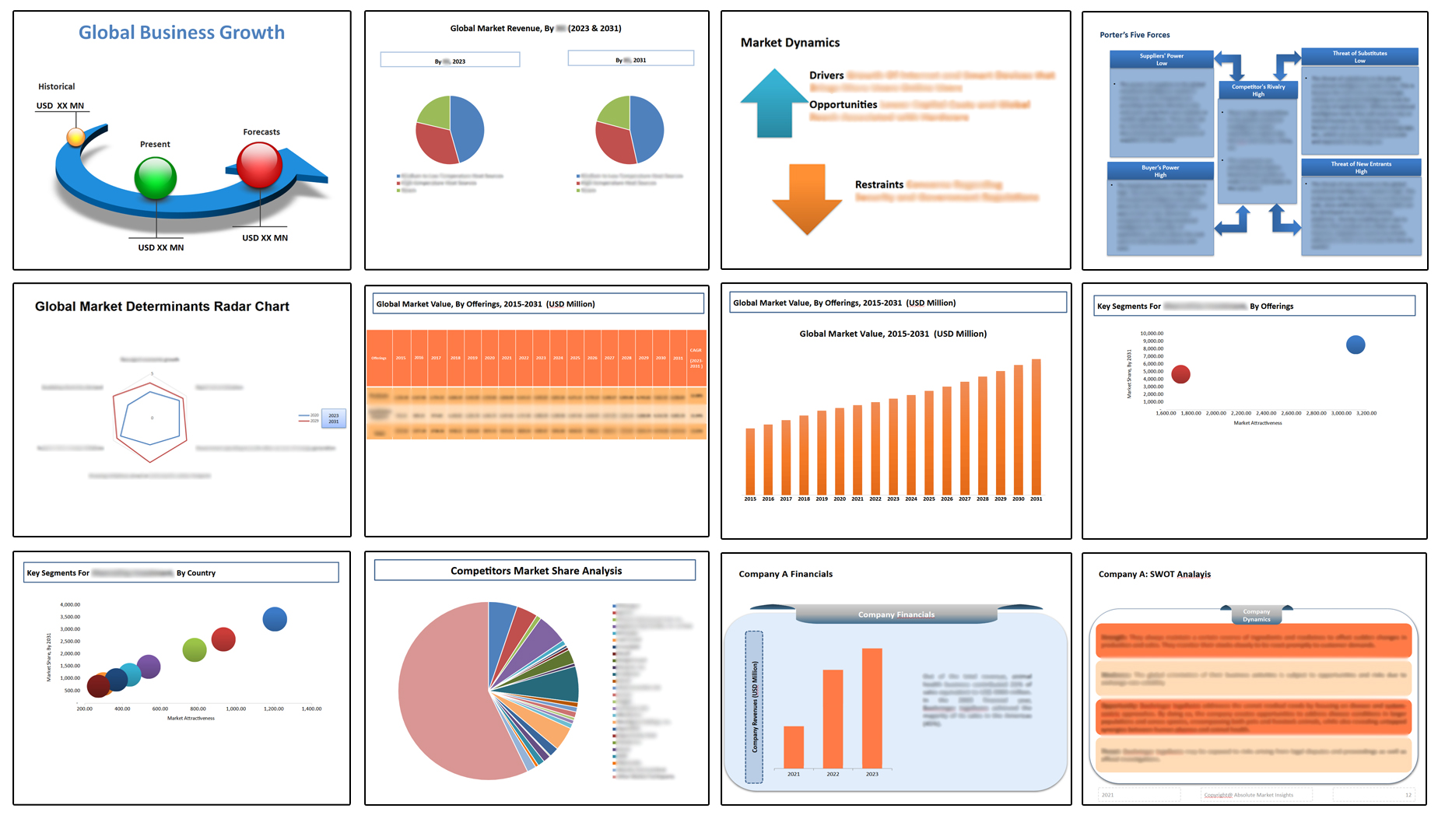Global Semiconductor Intellectual Property Market: By IP Core, By Type, By Model, By Application, By Region & Segmental Insights Trends and Forecast, 2024 – 2034
- Industry: Semiconductors & Electronics
- Report ID: TNR-110-1132
- Number of Pages: 420
- Table/Charts : Yes
- June, 2024
- Base Year : 2024
- No. of Companies : 10+
- No. of Countries : 29
- Views : 10152
- Covid Impact Covered: Yes
- War Impact Covered: Yes
- Formats : PDF, Excel, PPT
Semiconductor Intellectual Property (IP) refers to reusable design components or building blocks used in the creation of integrated circuits (ICs). These IP blocks are pre-designed and pre-verified, providing specific functionalities or features that can be integrated into larger chip designs. They can include cores for processors, memory controllers, interface protocols, and various other components essential for modern semiconductor devices. The use of semiconductor IP accelerates the development process, allowing companies to leverage proven technology without reinventing the wheel for each new project.
This not only reduces time-to-market but also lowers development costs and risks associated with designing complex semiconductor components from scratch. In an industry characterized by rapid technological advancements and increasing complexity, semiconductor IP plays a crucial role in innovation. It enables companies to focus on differentiating their products and meeting specific market demands while ensuring reliability and performance. This strategic use of IP is fundamental to the development of cutting-edge technologies in sectors such as consumer electronics, automotive, telecommunications, and more.
The demand for semiconductor intellectual property (IP) is driven by several critical factors that reflect the evolving needs of the technology landscape. One major driver is the rapid advancement in semiconductor technology, particularly in areas such as artificial intelligence, IoT, and 5G. These technologies require sophisticated and specialized IP blocks to ensure optimal performance and efficiency. Additionally, the increasing complexity of chip design necessitates the use of pre-verified and high-quality IP to reduce development time and costs. Companies are under pressure to bring innovative products to market quickly, and leveraging existing IP helps accelerate this process while minimizing risk.
Moreover, regulatory compliance and the need for reliable, proven components drive demand for semiconductor IP, ensuring that products meet industry standards and perform reliably. These factors collectively contribute to the growing demand for semiconductor intellectual property in the market.
In terms of revenue, the global semiconductor intellectual property market was worth US$ 7.5 Bn in 2023, anticipated to witness CAGR of 9.2% during 2024 – 2034.

Global Semiconductor Intellectual Property Market Dynamics
Technological Advancements: Rapid developments in technology, such as AI, IoT, and 5G, require advanced semiconductor IP to integrate new functionalities and improve performance. This drives demand for specialized and cutting-edge IP blocks. The competitive landscape of the semiconductor industry demands quicker product development cycles. Licensing semiconductor IP allows companies to accelerate time-to-market by integrating proven technologies rather than developing them from scratch.

Cost Efficiency: The high cost of R&D for developing proprietary IP motivates companies to license IP on a royalty basis, aligning expenses with revenue and reducing initial investment risks. Stringent regulations and standards in various industries, including automotive, consumer electronics, and telecommunications, drive the need for compliant semiconductor IP, ensuring safety and performance.

Consolidation and Collaboration: Mergers, acquisitions, and partnerships in the semiconductor industry led to the consolidation of IP portfolios and collaborative development efforts, enhancing the availability and diversity of semiconductor IP. Strong IP protection laws and enforcement in key markets encourage innovation and the creation of proprietary technologies, fostering a robust market for semiconductor IP licensing.
Royalty-Based Segment Has Garnered Major Market Share in the Global Semiconductor Intellectual Property Market During the Forecast Period (2024 – 2034).
The demand for royalty-based semiconductor intellectual property (IP) is driven by several key factors. One primary driver is the cost-efficiency and flexibility it offers semiconductor companies. By licensing IP on a royalty basis, companies can reduce upfront costs and align expenses with product success, making it financially viable for startups and smaller firms to access cutting-edge technology. Innovation pressure in the semiconductor industry also fuels this demand. As companies strive to integrate the latest functionalities, such as AI capabilities and advanced connectivity features, into their chips, they turn to royalty-based IP to accelerate development while minimizing risk.
This model allows firms to quickly incorporate proven technologies into their designs, speeding up time-to-market and maintaining competitiveness. Additionally, the evolving complexity of semiconductor design and the push for miniaturization make it increasingly impractical for companies to develop all IP in-house. Royalty-based IP offers a solution, providing access to specialized, high-quality IP blocks without the need for extensive R&D investment. These dynamic drives the growing demand for royalty-based semiconductor intellectual property in the industry.

By Application Consumer Electronics Segment had the Highest Share in the Global Semiconductor Intellectual Property Market in 2023.
The demand for semiconductor intellectual property (IP) in the consumer electronics sector is driven by several compelling factors. The rapid evolution of consumer electronics, such as smartphones, tablets, wearables, and smart home devices, requires increasingly complex and efficient semiconductor designs. This drives the need for high-quality semiconductor IP that can deliver enhanced performance, lower power consumption, and reduced time-to-market. Innovation in areas such as artificial intelligence, augmented reality, and advanced connectivity (like 5G) also spurs demand for specialized semiconductor IP to support these technologies.
Manufacturers are under constant pressure to release new products with improved features and capabilities, necessitating the use of pre-verified IP blocks to streamline the design process and ensure reliability. Additionally, consumer demand for devices with longer battery life, faster processing, and seamless connectivity pushes companies to leverage advanced semiconductor IP. This helps in optimizing power efficiency and integrating more functionalities into smaller form factors. As a result, the consumer electronics industry’s continuous quest for innovation and efficiency significantly drives the demand for semiconductor intellectual property.

By Region North America Dominated the Semiconductor Intellectual Property Market in 2023.
In North America, the demand for semiconductor intellectual property (IP) is driven by several key factors. The rapid advancement in technology and the push towards smaller, more efficient, and more powerful electronic devices necessitate the use of sophisticated semiconductor IP. This demand is particularly strong in sectors such as consumer electronics, automotive, and telecommunications, where the need for advanced integrated circuits and efficient power management is critical. Additionally, the proliferation of IoT devices and the rise of 5G technology are significant demand drivers. These technologies require highly specialized semiconductor IP to ensure optimal performance, connectivity, and power efficiency.
The increasing complexity of chip design and the need for shorter time-to-market further fuel the demand for reliable and pre-verified semiconductor IP blocks. Moreover, the North American market’s emphasis on innovation and the strong presence of major semiconductor companies and startups contribute to the growing demand. This environment fosters continuous development and integration of cutting-edge semiconductor IP to maintain competitive advantages and meet evolving technological needs.

Competitive Landscape: Global Semiconductor Intellectual Property Market:
- ALPHAWAVE SEMI
- Analog Bits
- Arm Limited
- ARTERIS, INC
- Cadence Design Systems, Inc.
- CEVA, Inc.
- Dolphin Design
- Dream Chip Technologies GmbH
- eMemory Technology Inc.
- Eureka Technology, Inc
- Frontgrade Gaisler
- Imagination Technologies
- Lattice Semiconductor
- Rambus
- Synopsys, Inc.
- TOPPAN Holdings Inc.
- VeriSilicon
- Other Industry Participants
Global Semiconductor Intellectual Property Market Scope
| Report Specifications | Details |
| Market Revenue in 2023 | US$ 7.5 Bn |
| Market Size Forecast by 2034 | US$ 19.7 Bn |
| Growth Rate (CAGR) | 9.2% |
| Historic Data | 2016 – 2022 |
| Base Year for Estimation | 2023 |
| Forecast Period | 2024 – 2034 |
| Report Inclusions | Market Size & Estimates, Market Dynamics, Competitive Scenario, Trends, Growth Factors, Market Determinants, Key Investment Segmentation, Product/Service/Solutions Benchmarking |
| Segments Covered | By IP Core, By Type, By Model, By Application, By Region |
| Regions Covered | North America, Europe, Asia Pacific, Middle East & Africa, Latin America |
| Countries Covered | U.S., Canada, Mexico, Rest of North America, France, The UK, Spain, Germany, Italy, Nordic Countries (Denmark, Finland, Iceland, Sweden, Norway), Benelux Union (Belgium, The Netherlands, Luxembourg), Rest of Europe, China, Japan, India, New Zealand, Australia, South Korea, Southeast Asia (Indonesia, Thailand, Malaysia, Singapore, Rest of Southeast Asia), Rest of Asia Pacific, Saudi Arabia, UAE, Egypt, Kuwait, South Africa, Rest of Middle East & Africa, Brazil, Argentina, Rest of Latin America |
| Key Players | ALPHAWAVE SEMI, Analog Bits, Arm Limited, ARTERIS, INC, Cadence Design Systems, Inc., CEVA, Inc., Dolphin Design, Dream Chip Technologies GmbH, eMemory Technology Inc., Eureka Technology, Inc, Frontgrade Gaisler, Imagination Technologies, Lattice Semiconductor, Rambus, Synopsys, Inc., TOPPAN Holdings Inc., VeriSilicon |
| Customization Scope | Customization allows for the inclusion/modification of content pertaining to geographical regions, countries, and specific market segments. |
| Pricing & Procurement Options | Explore purchase options tailored to your specific research requirements |
| Contact Details | Consult With Our Expert
Japan (Toll-Free): +81 663-386-8111 South Korea (Toll-Free): +82-808- 703-126 Saudi Arabia (Toll-Free): +966 800-850-1643 United Kingdom: +44 753-710-5080 United States: +1 302-232-5106 E-mail: askanexpert@thenicheresearch.com
|
Global Semiconductor Intellectual Property Market
By IP Core
- Soft
- Hard
By Type
- Processor IP
- Interface IP
- Memory IP
- Microcontroller IP
- Communication IP
- Foundation IP
- Analog IP
- Security IP
- Other IP
By Model
- Per Use
- Time Based
- Royalty Based
- Access Based
By Application
- Healthcare
- Automotive
- Consumer Electronics
- Telecommunications
- Others
By Region
- North America (U.S., Canada, Mexico, Rest of North America)
- Europe (France, The UK, Spain, Germany, Italy, Nordic Countries (Denmark, Finland, Iceland, Sweden, Norway), Benelux Union (Belgium, The Netherlands, Luxembourg), Rest of Europe)
- Asia Pacific (China, Japan, India, New Zealand, Australia, South Korea, Southeast Asia (Indonesia, Thailand, Malaysia, Singapore, Rest of Southeast Asia), Rest of Asia Pacific)
- Middle East & Africa (Saudi Arabia, UAE, Egypt, Kuwait, South Africa, Rest of Middle East & Africa)
- Latin America (Brazil, Argentina, Rest of Latin America)
Report Layout:

Table of Contents
Note: This ToC is tentative and can be changed according to the research study conducted during the course of report completion.
**Exclusive for Multi-User and Enterprise User.
Global Semiconductor Intellectual Property Market
By IP Core
- Soft
- Hard
By Type
- Processor IP
- Interface IP
- Memory IP
- Microcontroller IP
- Communication IP
- Foundation IP
- Analog IP
- Security IP
- Other IP
By Model
- Per Use
- Time Based
- Royalty Based
- Access Based
By Application
- Healthcare
- Automotive
- Consumer Electronics
- Telecommunications
- Others
By Region
- North America (U.S., Canada, Mexico, Rest of North America)
- Europe (France, The UK, Spain, Germany, Italy, Nordic Countries (Denmark, Finland, Iceland, Sweden, Norway), Benelux Union (Belgium, The Netherlands, Luxembourg), Rest of Europe)
- Asia Pacific (China, Japan, India, New Zealand, Australia, South Korea, Southeast Asia (Indonesia, Thailand, Malaysia, Singapore, Rest of Southeast Asia), Rest of Asia Pacific)
- Middle East & Africa (Saudi Arabia, UAE, Egypt, Kuwait, South Africa, Rest of Middle East & Africa)
- Latin America (Brazil, Argentina, Rest of Latin America)
The Niche Research approach encompasses both primary and secondary research methods to provide comprehensive insights. While primary research is the cornerstone of our studies, we also incorporate secondary research sources such as company annual reports, premium industry databases, press releases, industry journals, and white papers.
Within our primary research, we actively engage with various industry stakeholders, conducting paid interviews and surveys. Our meticulous analysis extends to every market participant in major countries, allowing us to thoroughly examine their portfolios, calculate market shares, and segment revenues.
Our data collection primarily focuses on individual countries within our research scope, enabling us to estimate regional market sizes. Typically, we employ a bottom-up approach, meticulously tracking trends in different countries. We analyze growth drivers, constraints, technological innovations, and opportunities for each country, ultimately arriving at regional figures.Our process begins by examining the growth prospects of each country. Building upon these insights, we project growth and trends for the entire region. Finally, we utilize our proprietary model to refine estimations and forecasts.
Our data validation standards are integral to ensuring the reliability and accuracy of our research findings. Here’s a breakdown of our data validation processes and the stakeholders we engage with during our primary research:
- Supply Side Analysis: We initiate a supply side analysis by directly contacting market participants, through telephonic interviews and questionnaires containing both open-ended and close-ended questions. We gather information on their portfolios, segment revenues, developments, and growth strategies.
- Demand Side Analysis: To gain insights into adoption trends and consumer preferences, we reach out to target customers and users (non-vendors). This information forms a vital part of the qualitative analysis section of our reports, covering market dynamics, adoption trends, consumer behavior, spending patterns, and other related aspects.
- Consultant Insights: We tap into the expertise of our partner consultants from around the world to obtain their unique viewpoints and perspectives. Their insights contribute to a well-rounded understanding of the markets under investigation.
- In-House Validation: To ensure data accuracy and reliability, we conduct cross-validation of data points and information through our in-house team of consultants and utilize advanced data modeling tools for thorough verification.
The forecasts we provide are based on a comprehensive assessment of various factors, including:
- Market Trends and Past Performance (Last Five Years): We accurately analyze market trends and performance data from preceding five years to identify historical patterns and understand the market’s evolution.
- Historical Performance and Growth of Market Participants: We assess the historical performance and growth trajectories of key market participants. This analysis provides insights into the competitive landscape and individual company strategies.
- Market Determinants Impact Analysis (Next Eight Years): We conduct a rigorous analysis of the factors that are projected to influence the market over the next eight years. This includes assessing both internal and external determinants that can shape market dynamics.
- Drivers and Challenges for the Forecast Period:Identify the factors expected to drive market growth during the forecast period, as well as the challenges that the industry may face. This analysis aids in deriving an accurate growth rate projection.
- New Acquisitions, Collaborations, or Partnerships: We keep a close watch on any new acquisitions, collaborations, or partnerships within the industry. These developments can have a significant impact on market dynamics and competitiveness.
- Macro and Micro Factors Analysis:A thorough examination of both macro-level factors (e.g., economic trends, regulatory changes) and micro-level factors (e.g., technological advancements, consumer preferences) that may influence the market during the forecast period.
- End-User Sentiment Analysis: To understand the market from the end-user perspective, we conduct sentiment analysis. This involves assessing the sentiment, preferences, and feedback of the end-users, which can provide valuable insights into market trends.
- Perspective of Primary Participants: Insights gathered directly from primary research participants play a crucial role in shaping our forecasts. Their perspectives and experiences provide valuable qualitative data.
- Year-on-Year Growth Trend: We utilize a year-on-year growth trend based on historical market growth and expected future trends. This helps in formulating our growth projections, aligning them with the market’s historical performance.
Research process adopted by TNR involves multiple stages, including data collection, validation, quality checks, and presentation. It’s crucial that the data and information we provide add value to your existing market understanding and expertise. We have also established partnerships with business consulting, research, and survey organizations across regions and globally to collaborate on regional analysis and data validation, ensuring the highest level of accuracy and reliability in our reports.








